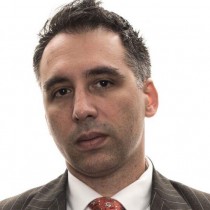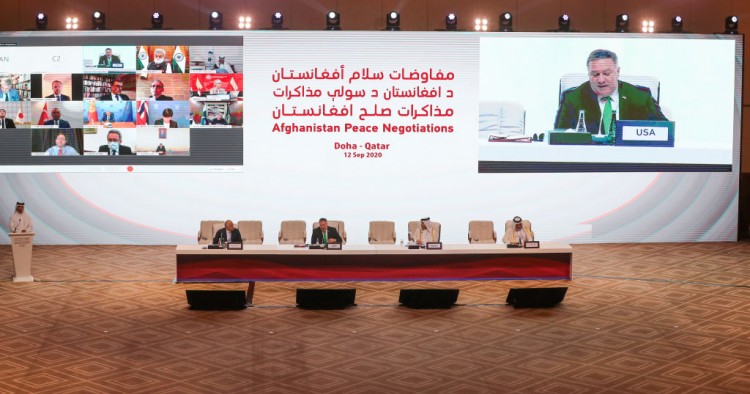This week's briefing on recent news and upcoming events in the region featuring Marvin G. Weinbaum, Grace Wermenbol, Jason Pack, Shahla Al-Kli, and Khaldoun Khelil.
Intra-Afghan talks begin with pomp and circumstance
Marvin G. Weinbaum
Director for Afghanistan and Pakistan Studies

Fitted with all the accustomed ceremonial trappings the long-delayed Afghan peace talks finally got underway in Doha on Sept. 12. A 21-member Taliban delegation, many former Taliban officials from the 1990s, sat across from — separated by several yards — a more diverse Afghan government-led team of 19. Also participating were the well-wishing representatives of several governments and international organizations. The obligatory opening speeches were delivered where the most memorable takeaway was the government’s side urging “flexibility” in negotiations and the Taliban’s advising “patience.” More substantive discussions are expected to begin today, in what is only the first round in a certain to be lengthy, contentious process. The size and composition of the delegations suggest that the talks are likely to remain mainly a rhetorical exercise. If serious negotiations take place, they will involve far fewer participants, likely on the sidelines of the formal meetings. Despite wide, if mostly guarded optimism, on one proposition nearly everyone who gathered in Doha could probably privately agree. Judged against a backdrop of heightened Taliban-initiated violence, disappearing international force protection, and a Kabul government’s supine negotiating record, the Taliban holds the upper hand in peace talks. Some would put it in the driver’s seat.
Just as the talks began word came from Kabul of Taliban attacks across 18 of the country’s 34 provinces. Since the signing of the U.S. withdrawal agreement with the Taliban, which many had hoped would bring an early cease-fire, a reported 12,000 Afghans have been killed and 15,000 injured. Many consider the Taliban’s agreeing to a cease-fire the litmus test of its sincerity in wanting a peaceful end to the conflict. Arranging a lasting cease-fire may be the number one agenda item for the Doha talks, but no Taliban delegation seems likely to surrender what most would agree is its most powerful negotiating card — military pressure. Not waiting for any signs of progress in the talks, Secretary of State Mike Pompeo, addressing the Doha meeting, declared a “momentous breakthrough” to end the conflict. Buoyed by the start of talks, the U.S. is certain to go ahead with a decision to have 4,500 troops or fewer in Afghanistan by November. President Ashraf Ghani reiterated last week a pledge that the Islamic republic system was not up for debate and that the Afghan people would not tolerate its collapse. Several delegates expressed similar sentiments in Doha. If they hold firm, a questionable proposition, there may be little to talk about with the Taliban now or down the road.
This article was co-authored by Hamid Safi, Ghasharib Shoukat, and Jack Stewart, research assistants to Marvin G. Weinbaum.
Normalization deal does nothing to advance Israeli-Palestinian peace
Grace Wermenbol
Non-resident Scholar

President Donald Trump’s brokering of a normalization agreement between Israel and the United Arab Emirates (UAE) has been heralded as a “historic peace deal” and “the only way to stop Israel’s annexation of the territories in the West Bank.” In the run-up to the formal signing of the so-called “Abraham agreement,” which will take place tomorrow, the president was nominated for the Nobel Peace Prize — ostensibly recognizing the realization of the trilateral partnership touted by the Trump administration.
A formal recognition ¬— and deepening — of the bilateral ties that have been in existence between Israel and the UAE clearly offers security and economic opportunities to both nations, including military acquisitions routed and authorized through Washington. However, the agreed-upon normalization will neither reinvigorate the possibility of a two-state solution nor halt Israeli expansion — and de facto annexation — of West Bank settlements.
In light of the normalization agreement with the UAE, Israeli Prime Minister Benjamin Netanyahu claims that the deal proves that Israel does not need to retreat from occupied Palestinian land to achieve peace and normalization with Arab states — as had been stipulated by the 22 members of the Arab League during the 2002 Beirut summit. At the same time, Netanyahu is unlikely to reverse his settlement project or indeed halt settlement expansion. In a nationwide televised address held following the announcement of the agreement, Netanyahu thus hinted at the possibility of future annexation, stating that “full and formal peace” with the UAE meant acceding to the U.S. request to “temporarily wait” on his pledge to implement sovereignty over parts of the West Bank and emphasized that he “did not and will not remove sovereignty from the agenda. … I will never give up on our right to our land.”
In a recent piece published by The Washington Post, Jared Kushner, the U.S. president’s son-in-law and Middle East peace point man, claims that “remarkable progress” has been made over the past several years in the Middle East. Instead, it is hard to identify a single point of progress concerning Israeli-Palestinian peace that is the result of U.S. intervention. Trump’s preternatural, pro-Israel policy has alienated the Palestinian Authority and challenged the U.S.’ ability to act as an impartial mediator. Beyond a clear diplomatic re-evaluation of the Palestinian cause, the UAE’s normalization of ties with Israel is unlikely to offer much more.
Libyans’ will to power
Jason Pack
Non-Resident Scholar

Since mid-August 2020, Libyans have been experiencing their Black Lives Matter moment. COVID-19 is spreading like wildfire and power cuts are rallying Libyans to join widespread street protests. These demonstrations, far more than last week’s internationally-mediated peace talks in Morocco, will set the political tempo for the next stage in the country’s ongoing civil war.
Libyans have been united on precious few issues over the past years, but one thing they seem to agree on is that those in positions of authority have a sacred responsibility to keep the lights on and the air conditioning humming — despite the fact that it is Libya’s subsidy regime and a lack of social discipline that are the root causes of electricity overconsumption.
Weeks of protests in western Libya led to a cabinet reshuffle by Prime Minister Fayez al-Serraj, and now the east is joining the act. On Sept. 13, in Benghazi, protesters set fire to both the headquarters of the internationally-unrecognized “Interim Government” and the House of Representatives (HoR); in al-Bayda, they burned garbage and tires; and in al-Marj, they set fire to the city's Security Directorate.
This is the first time that protests have occurred in al-Marj, the stronghold of Gen. Khalifa Hifter's power. Hifter’s popularity has been waning among his international backers and his domestic supporters since losing the War for Tripoli, yet in the protests he still sees an opportunity. Sensing this opening, Hifter likely directed the “Interim Government” to submit its resignation. The speaker of the HoR, Aguila Saleh, has not accepted this resignation as he wishes to maintain the fig leaf of the existence of the “Interim Government” to continue to bolster his authority to negotiate on the east’s behalf in Morocco. The next moves will likely see Hifter attempt to wrestle power away from Saleh and claim that he must be nominally included in all international negotiations.
Continuing protests will increase pressure on Libyan delegations participating in the Morocco talks to push for genuine reform of its semi-sovereign institutions. It may also encourage Hifter to lift the oil blockade as means of using hydrocarbon production and ensuing revenues to bolster the struggling electricity sector. Nonetheless, we shouldn’t get our hopes up. Such a lifting of the blockade is unlikely in the immediate to short term, and American diplomatic announcements over the weekend that Hifter has committed to lift the blockade seem premature, yet again.
Iraqis aren’t paying attention to America’s troop withdrawal
Shahla Al-Kli
Non-resident Scholar

On Sept. 10 the Trump administration announced it will withdraw almost half of its troops in Iraq, reducing the number of combat personnel from 5,200 to 3,000. The announcement was not a surprise, as the U.S. started handing over key military bases in Iraq in 2018, with the eighth base — al-Taji military camp — being handed over to the Iraqi Army at the end of August as part of a transition from a mixed direct combat assistance and training advisory mission to a training-focused advisory one.
Talks about the U.S. troop presence have been ongoing since June 2020 and moved to the fore with Prime Minister Mustafa al-Kadhimi’s visit to Washington in August. However, the announcement is as much about U.S. domestic politics as anything else, coming in the midst of a heated presidential election and with the Trump campaign’s emphasis on the theme of “promises kept.” Thus, it concerns the Americans more than the Iraqis, especially as the U.S.’ real military capabilities and posture will not be affected.
Gen. Kenneth F. McKenzie Jr., commander of U.S. Central Command, allayed concerns about the impact of a partial withdrawal on Iraq’s stability, stating, “This reduced footprint allows us to continue advising and assisting our Iraqi partners in rooting out the final remnants of ISIS in Iraq and ensuring its enduring defeat.” He also maintained that it wouldn’t affect the security of U.S. troops, noting that the remaining American forces will include personnel operating Patriot missile batteries and other defenses against attacks from Iran or Iranian-backed militias. In addition, Gen. McKenzie stressed the move would not affect U.S. capabilities in the Middle East more broadly, nor would it affect its current policy on Iran: “We have what we need to maintain a rough deterrence against Iran.” The U.S. has strategic military bases in several Arab countries and strong military and air capabilities for rapid deployments to places like Iraq.
On the Iraqi side, PM al-Kadhimi highlighted the continuing need for advanced military training and intelligence support as “ISIS sleeper cells are still operating in Iraq” and “The threat is still there.” Such targeted support is vital to address what has morphed into low-intensity operations in difficult terrain between the provinces of Kirkuk, Diyala, and Salah al-Din — a fight that require acute intelligence and air force capabilities rather than traditional ground operations. The Iraqi Council of Representatives’ January non-binding decree urging the government to expel U.S. troops has little public support as it was boycotted by the Kurds and Sunnis, as well as some moderate Shi’a factions. It was widely considered to reflect the position of Iranian political proxies and viewed as an Iranian attempt to retaliate after the U.S. killed Iranian Gen. Qassem Soleimani in Baghdad at the beginning of 2020.
Unlike in 2011, most Iraqis have different priorities now and are worried about the many acute crises directly affecting their daily life and standard of living. Iraq’s oil revenues have fall sharply following a severe drop in prices, adding to the challenges of an economy already struggling with the aftershocks of COVID-19. The pandemic overshadows Iraqis’ other priorities, as the public has experienced firsthand the weakness of the country’s health system, and the number of cases continues to rise. While public demonstrations have subsided somewhat and are now sporadic, the mass protests that erupted in October brought public trust in the government to a new low, undercutting its legitimacy, and repeated militia assassinations of public figures and activists have increased the popular pressure and demands to bring the killers to justice. The tens of thousands of Iraqis who marched in these demonstrations decried rampant government corruption, poor services, unemployment, as well as the mushrooming of the pro-Iranian militias. The militias have started to impact not only the security situation but also monopolized major economic activities in many Iraqi provinces, especially lucrative border crossings and strategic trade routes linking the provinces.
Furthermore, the announcement of about $8 billion in deals with U.S. energy companies during PM al-Kadhimi’s visit to Washington has increased Iraqis’ expectations about the possibility of benefiting from U.S. private investment. While Iran’s political and military proxies have tried to direct the narrative toward the U.S. troop withdrawal, linking it to their attacks against the American military and logistics convoys, the overall focus of most Iraqi media was on PM al-Kadhimi’s visit to the Kurdistan region and its impact on allocations in the 2020-21 budget.
Finally, political and public attention completely shifted following Ayatollah Ali Sistani’s strong statement during his meeting with Jeanine Hennis-Plasschaert, U.N. special representative for Iraq and head of the U.N. Assistance Mission for Iraq (UNAMI), on Sept. 13. This statement clearly addressed the issue of the militias, the importance of holding early elections, and the need to involve UNAMI to secure the integrity of the elections and increase public trust in the political process. This implicitly supported PM al-Kadhimi’s recent steps to address corruption and consolidate power in the hands of the state. Sistani was unusually forceful and direct in his remarks and the steps required by the Iraqi political establishment. He refrained from mentioning the U.S. troop withdrawal announcement, even though he was vocal about the issue in 2011.
The debate about America’s presence in Iraq and its troop numbers has started to become a marginal issue that is of concern only to a specific faction within Iraqi politics, rather than the broader public, and Iraqis’ reaction to the recent announcement clearly reveals their change in priorities.
Proposed amendments to the Algerian constitution
Khaldoun Khelil
Non-resident Scholar

On Sept. 10 and 12, the lower and upper houses of Algeria’s Parliament adopted a series of proposed amendments to the Algerian constitution. According to a draft released by the Algerian presidency, the amendments include a provision allowing for the national army to participate in foreign missions, a proposal to incorporate the Berber Amazigh language, the creation of the position of vice president, and a formalization of how prime ministers will be appointed by the Algerian president.
Under the new amendments, the Algerian president can consult with Parliament before allowing the army to participate in missions outside the country’s borders. This would be a major shift as Algeria is currently constitutionally restrained from sending its army on missions abroad.
The proposed amendments also suggest that the issue of the inclusion of the Berber Amazigh language as one of the country’s official national languages should be settled.
The role of vice president will not have a lot of power but will ensure political continuity in case the president is incapacitated. The position of prime minister, by contrast, will remain operationally powerful, but the president will now be obliged to select a prime minister from a member of the majority party in Parliament.
The constitutional amendments are set to be put to a popular referendum on Nov. 1.
Photo by KARIM JAAFAR/AFP via Getty Images
The Middle East Institute (MEI) is an independent, non-partisan, non-for-profit, educational organization. It does not engage in advocacy and its scholars’ opinions are their own. MEI welcomes financial donations, but retains sole editorial control over its work and its publications reflect only the authors’ views. For a listing of MEI donors, please click here.













